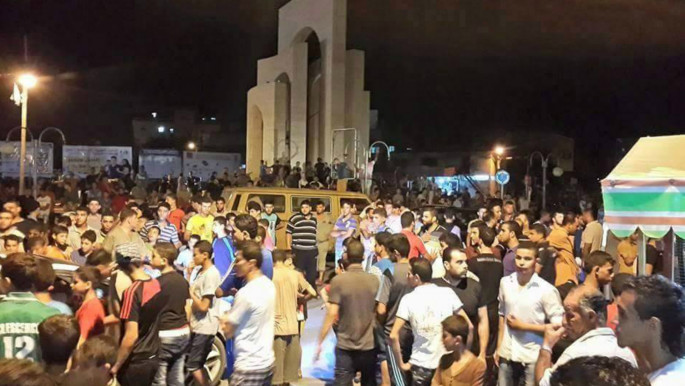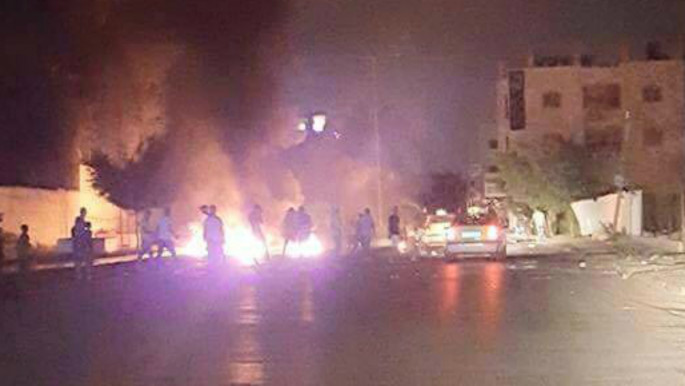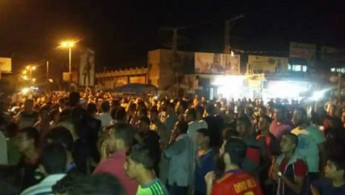Palestinians protest electricity crisis
A large demonstration in Rafah protested against severe electricity crisis in Gaza, while a street in the West Bank was barricaded in reaction to increasing power cuts in Tulkaram.
4 min read
Protesters in Rafah demonstrated against 23-hour power cuts [facebook]
3000 protesters gathered in front of a Gaza electricity company Tuesday night to protest the worsening power cuts in the city.
The demonstration at the Rafah electricity company in southern Gaza, which lasted for around three hours, ended in the resignation of the chairman of the electricity company, and pledges that the area will return to eight hours of electricity a day.
As Gaza rarely experiences such open dissent, the protest points to the growing power crisis in the strip.
Residents of Rafah told al-Araby al-Jadeed that in recent weeks the city has been severely deprived of electricity, which has often only been on for an hour a day in certain areas.
This is particularly painful as Palestinians are also experiencing the effects of a heatwave gripping the region, and are struggling without fans or air-conditioning.
Electricity that powers Rafah comes from Egypt, and supplies have continually been disrupted by clashes between the Egyptian military and militants in Sinai.
The demonstration at the Rafah electricity company in southern Gaza, which lasted for around three hours, ended in the resignation of the chairman of the electricity company, and pledges that the area will return to eight hours of electricity a day.
As Gaza rarely experiences such open dissent, the protest points to the growing power crisis in the strip.
Residents of Rafah told al-Araby al-Jadeed that in recent weeks the city has been severely deprived of electricity, which has often only been on for an hour a day in certain areas.
This is particularly painful as Palestinians are also experiencing the effects of a heatwave gripping the region, and are struggling without fans or air-conditioning.
 |
|
| Protesters gathering in Rafah on Tuesday night [facebook] |
Electricity in Rafah is also frequently ciphened to Khan Younis, due to the neighbouring city's problems with Israeli supply.
"When Egypt cut the line to Gaza, Rafah was alone in the dark...we just have power for two out of twenty-four hours, its not fair," said Moatessem Khaled, who joined the protest.
"Why do they do this to Rafah? Hamas tells us to be patient," he said.
Palestinians in Gaza are not currently sure who to directly blame for the recent crisis; Egypt, the electricity company, or the government in Gaza who are responsible for scheduling cuts which are intended to create a fair distribution of electricity hours across the Gaza Strip.
"We don’t really care who is responsible…we just want our electricity", said Ahmed L., a resident of Rafah.
The crisis has been exasperated by the rising cost of fuel for generators that are often used by households in the case of blackouts.
Following price hikes on all goods in Gaza that followed Egypt's destruction of the smuggling tunnels, the cost of a litre of oil has risen from two shekels to seven shekels.
The Gaza Strip's only power plant is still damaged from the 2014 Gaza war, and has been struggling to produce enough power for months.
The crisis worsened after the plant halted production in March as it was unable to pay a tax imposed by the Palestinian Authority in the West Bank for allowing fuel to be imported to Gaza.
Barricade in the West Bank
Shortly after the protest in Gaza started on Tuesday night, protesters in the West Bank blocked off Nablus Street in Tulkaram with a barricade.
 |
|
| Demonstrators barricade a street in the West Bank [facebook] |
The West Bank has its own complex electricity quagmire; much of the area's electricity is from Israel, which is then sold to the PA, who sell it to companies who supply households.
Refugee camps in the West Bank used to be exempted from electricity costs. However, after Palestinian power companies complained about accumulating debt, Salam Fayyad, former Prime Minister of the PA signed a deal in 2013 that required Palestinian refugees to pay their own costs.
A Palestinian from Balata refugee camp, Nablus, protested the plan by attempting to set himself on fire.
Since then households in refugee camps have faced increasing debts, and experiencing increasingly severe power outages.
In 2013, protesters in Tulkaram burnt tires to demonstrate against the Tulkarem municipality installation of prepaid electricity meters in the camp, introduced as part of the Fayyad deal.
The municipality is still attempting to enforce the use of these meters, which do not allow for households to accrue debt. However residents unable to pay often connect their homes to the grid in order to bypass the meters.
The PA is reportedly in talks to privatize the electricity supply in the North of the West Bank in order to avoid such problems, as well as increase profit.





![The UAE is widely suspected of arming the RSF militia [Getty]](/sites/default/files/styles/image_330x185/public/2024-11/GettyImages-472529908.jpg?h=69f2b9d0&itok=Yauw3YTG)
![Netanyahu furiously denounced the ICC [Getty]](/sites/default/files/styles/image_330x185/public/2024-11/GettyImages-2169352575.jpg?h=199d8c1f&itok=-vRiruf5)
![Both Hamas and the Palestinian Authority welcomed the ICC arrest warrants [Getty]](/sites/default/files/styles/image_330x185/public/2024-11/GettyImages-2178351173.jpg?h=199d8c1f&itok=TV858iVg)